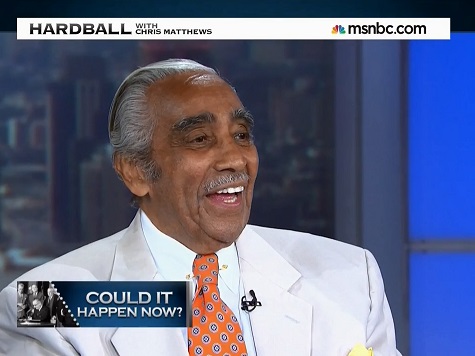On Wednesday’s “Hardball” on MSNBC, Rep. Charles Rangel (D-NY) discussed a proposition from Vanity Fair magazine’s Todd Purdum that if it were up to Congress in 2014 to pass the Civil Rights Act of 1964, it would likely not happen.
Rangel told “Hardball” fill-in host Steve Kornacki that it would attributable to the modern-day Tea Party, which he said was hard to distinguish from those that opposed that era’s civil rights legislation, which at the time were Democrats that found themselves in opposition to Democratic President Lyndon Johnson and would later become what known as Dixiecrats.
Rangel argued history as a record proved his assertions and said they were similar in the flags they wave and the geographic parts of the country from where their members of Congress are elected.
Partial transcript as follows:
KORNACKI: So, congressman, I will start with you. So that premise, the proposition that Todd Purdum put out – the Civil Rights Act that passed in 1964 wouldn’t pass in 2014. Do you agree with that?
RANGEL: I don’t see how anyone that follows history — first of all, the strongest opposition to President Johnson came from Dixiecrats. He had the support of Republicans. Johnson said that it would destroy the Democratic Party as we know it. And it did. So as soon as blacks had the right to vote, the Dixiecrats changed party.
KORNACKI: Southern conservative Democrats switched over to Republicans.
RANGEL: And if you take a look at where the Dixiecrats are and take where the Tea Party people are, it is hard to distinguish. Find out where the Confederate flag is that they wave with the Tea Party. Find out which states hated Lincoln and which states have representatives that hate Obama. Find out which states held slaves.
KORNACKI: So when you say that – when you look at the Tea Party today, and you can say that this is a movement with a lot of support, from its heavily white, heavily southern, very conservative. Certainly back then heavily white southern and all that, is race the motivating factor are you saying for the Tea Party, though?
RANGEL: I don’t have to say a darn thing except you can see where they come from. You can see what the opposition has been to voting rights and integration and all of those things. You know it came from the South, right? Now, if you see the same people changing their name, are you asking me, should I call the Tea Party white racists?
KORNACKI: The Tea Party would say, like, those were our grandparents or our parents — different generations. Our generation has nothing to do with that.
RANGEL: I am only saying what history would record. Now the Confederate flag didn’t belong to them. It belonged to their grandparents.They still wave it. And the opposition to voting didn’t belong to the Republican Party. They brought that with them to the Tea Party. So I don’t know why people even have to discuss the difference between the make-up of the House of Representatives.
Follow Jeff Poor on Twitter @jeff_poor

COMMENTS
Please let us know if you're having issues with commenting.